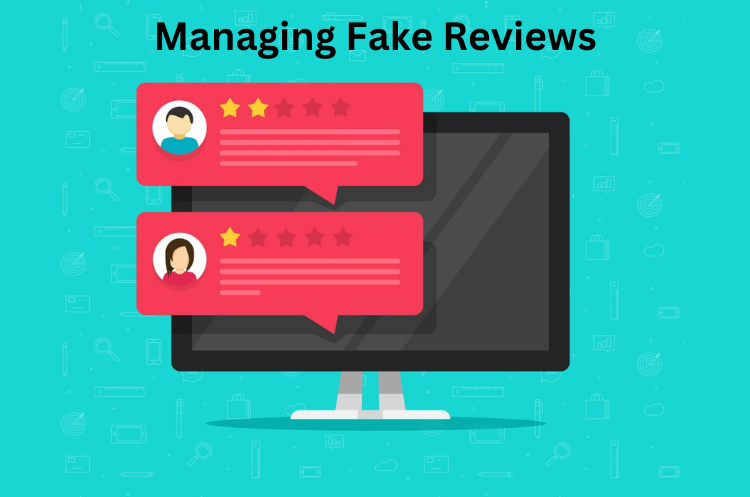
Managing False Online Reviews: A Guide for Upholding Your Business Reputation
False Online Reviews serve as an invaluable extension of the traditional “word-of-mouth” marketing strategy. When a customer engages with a product or service, their subsequent review can influence a vast audience. Studies consistently highlight the significance of these reviews, with 95 percent of consumers admitting to reading online reviews before making a purchase decision. Moreover, a staggering 94 percent of individuals have indicated that an online review has swayed them to either avoid a particular brand or patronize it. The impact of negative reviews on your business reputation cannot be understated – its ramifications can be dire.
However, the solution lies in effectively addressing customer service glitches, product shortcomings, and other issues to encourage the generation of more positive reviews moving forward. The question then becomes: how can this be accomplished? It Is imperative to acknowledge that not all negative online reviews are genuine. False reviews are often orchestrated by spammers, competitors, or disgruntled customers who aim to tarnish your brand’s reputation. Dealing with these deceitful reviews requires a strategic approach and, at times, reporting them to search engines, like Google, for intervention.
Detecting Bogus Reviews
While certain businesses may contemplate purchasing reviews to bolster their online image, this practice is fraught with legal consequences and is thus inadvisable. Amazon’s legal actions against fabricated seller reviews exemplify the potential repercussions of such endeavors. Equipped with the knowledge that buying fake reviews is ill-advised, let’s delve into methods for identifying them on search engines, review sites, or social platforms.
Identifying Fake Reviews: 5 Key Indicators
Superficial Details: Genuine reviews are characterized by specific details that stem from actual experiences. Conversely, fraudulent reviews often employ generic praises without delving into particulars. For instance, a research study conducted by Cornell revealed that authentic hotel reviews tend to use precise terms like “bathroom,” “check-in,” or “price,” while deceptive reviews focus on creating an ambiance with terms like “vacation,” “business trip,” or “my husband.”
Verb Excess: Authentic reviews predominantly employ nouns to describe situations, whereas fake reviews substitute these with verbs. This overuse of “action” verbs is intended to confer credibility but typically results in the opposite effect.
Pronoun Overload: Dishonest reviewers endeavor to appear sincere by incorporating an abundance of first-person pronouns such as “I” and “me.”
Extreme Rating Bias: Although not all one or five-star reviews are fraudulent, some may be. Excessively positive or negative reviews might be fabricated attempts to significantly boost or diminish a product or service’s average rating.
Inconsistent Reviewer History: Suspicions are aroused when a reviewer lacks any review history, exhibits excessive reviews, or employs identical language across multiple reviews. Platforms generally offer the option to view a reviewer’s profile, facilitating investigation.
Managing Fake Reviews: Taking Action

In addition to responding to adverse reviews (which is always recommended), removal of fake reviews necessitates adherence to the outlined criteria. The challenge lies in Google’s inability to definitively identify genuine customers, as a mere denial of purchase from your side won’t suffice. Establishing online identities is intricate, especially given Google’s allowance of anonymous usernames. Furthermore, making a purchase isn’t obligatory for engaging with a brand.
Google offers detailed guidelines for responding to such reviews. The prescribed approach includes brevity, diplomacy, and mirroring the manner in which you address genuine negative reviews. A sample response could be as follows:
Hello [Reviewer’s Name],
We take such matters very seriously. Regrettably, we are unable to locate any record or recollection of your interaction with us. If indeed you have transacted with us, we are eager to delve deeper into this matter. Kindly contact [Name] immediately at [Email] for us to address this issue promptly.
Once your response is in place, proceed to flag the review.
Flagging initiates the “Report a Policy Violation” procedure, where your email address is submitted along with the chosen Violation Type. Upon submission, Google may seek further information. To expedite this process and enhance the likelihood of review removal, engage others to flag the review as well. While the standard path generally results in a response within a few days, reviews containing offensive language might necessitate direct communication with Google’s support team. This is achieved through these steps:
Access your Google My Business dashboard.
Navigate to the Reviews section.
Choose “Support” from the home menu.
Opt for email or phone contact.
Fill in the necessary details.
Google assures a response within two business days. Once contacted, substantiate your claim that the review is false, elucidate why its removal is warranted, and cite instances, links, or images to bolster your stance. If required, a Google support representative may escalate the matter to a specialist. Following their verdict, expect a call or email notification.
Alternate Avenues for Assistance
Small business proprietors may opt for alternative channels, such as tweeting the Google Small Business Support Team or seeking guidance from the Google Community. The latter involves these steps:
Visit the Spam & Policy Forum within Google My Business.
Browse akin issues or post a new query.
Consider existing answers.
While these measures don’t guarantee removal of fake reviews, they can substantially aid your cause.
Similar strategies can be applied on platforms like Facebook and Instagram. Additionally, don’t hesitate to engage a support team for assistance. Timely, courteous response to each review, particularly negative ones, is pivotal. Approach the situation with composure, addressing it professionally. The more you invest in customer satisfaction and evidencing your commitment, the more favorable your future reviews will be.
Building a Better Online Reputation with Build Brand Better
As you navigate the intricate landscape of online reputation management, consider seeking the expertise of professionals in the field. We, at Build Brand Better, specialize in comprehensive online reputation management solutions that empower your business to combat fake reviews and foster a positive online image. Our tailored strategies encompass effective review monitoring, engagement, and reporting false reviews to platforms like Google. Our dedicated team of experts ensures that your business’s reputation remains untarnished, shielding it from the repercussions of deceitful reviews. As a leading online reputation management company, we pride ourselves on our commitment to transparency, authenticity, and client success.
FAQ
Q1: What are fake online reviews, and why are they a concern for businesses?
A1: Fake online reviews are fabricated or misleading reviews posted with the intent to deceive consumers or damage a business’s reputation. They are a concern for businesses because they can harm a company’s credibility, influence potential customers negatively, and impact revenue. Addressing fake reviews is crucial to maintain a positive online reputation.
Q2: How can I spot a fake online review?
A2: Fake online reviews often lack specific details, use an excessive number of verbs, include an abundance of first-person pronouns, exhibit extreme rating biases (one or five stars), and may come from reviewers with suspicious or inconsistent reviewing histories. These are key indicators to look for.
Q3: Is it legal to purchase online reviews for my business?
A3: Purchasing online reviews is generally considered unethical and may have legal consequences. Many platforms, like Amazon, have taken legal actions against businesses and individuals engaged in fake review schemes. It’s advisable to avoid this practice.
Q4: How can I respond to a fake online review on platforms like Google?
A4: When responding to fake reviews, it’s essential to be brief, polite, and professional. Express your commitment to addressing the matter and request further contact to investigate the issue. Avoid confrontational language and maintain a diplomatic tone.
Q5: Can I remove fake reviews from Google?
A5: Removing fake reviews from Google can be challenging. Google’s policies require evidence of the review’s falseness, which can be difficult to provide. However, you can flag the review and follow up with Google support. Building a case with supporting evidence increases the chances of review removal.
For more Blogs:- www.buildbrandbetter.io/blog/
